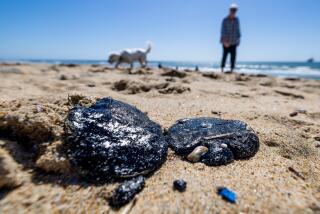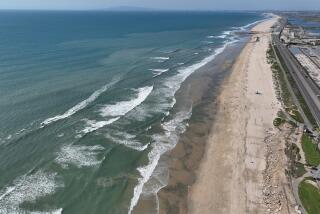Crews Spray Oil-Eating Microbes in Effort to Clean Up Gulf Spill
- Share via
GALVESTON, Tex. — Crews on Friday began spraying oil-eating microbes on the slick surrounding the burning supertanker Mega Borg in the first open-sea release of the bacteria to clean up a an oil spill.
The Coast Guard warned it was possible that tar balls from the 30-mile-long slick extending from the Norwegian vessel would wash ashore Friday in Galveston, although county officials said they had no reports of oil.
“We have not had any indication of any oil coming ashore,” Pat Hallisey, executive director of the Galveston County Beach Park Board, said. “We’re keeping our fingers crossed.”
Coast Guard Petty Officer Gene Maestas said there were some “streams of oil,” but the captain of the port ordered skimmers out to collect them.
The Coast Guard raised its estimate of the amount of oil released into the Gulf of Mexico to 4.3 million gallons, making it the nation’s fifth largest spill. The Coast Guard would not elaborate on how it reached the 4.3-million-gallon estimate. The spill had been estimated previously at 3 million gallons.
Crews on four fireboats continued spraying water on the 886-foot ship, which exploded and caught fire late last Friday, 57 miles off Galveston. Gray smoke spewed from the rear section.
The Coast Guard said that most of the light African crude evaporated or burned, and less than 14,000 gallons remained in the water.
The largest sheen of oil extended from the vessel for about 10 miles to the northwest, with two additional patches beginning 10 miles farther. The slick nearest to land was about 25 miles away.
In the experimental use of the microbes, officials working on a Coast Guard boat mixed the sand-like bacteria with sea water and sprayed it on a section of the oil slick.
The process, known as bioremediation, has never been tried on an oil spill in open seas, officials said.
The bacteria eats the oil and reduces it to a fatty substance that would not be harmful to sea life. When the oil runs out, the microbes die.
More to Read
Sign up for Essential California
The most important California stories and recommendations in your inbox every morning.
You may occasionally receive promotional content from the Los Angeles Times.













